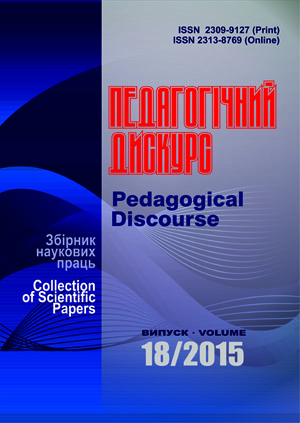Application of the Main Didactic Principles for Foreign Language Teaching with the Help of the Interdisciplinary Approach
Abstract
An interdisciplinary approach has a big number of different advantages which cause the necessity to apply it in all technical institutions of higher education. The list of recent dissertations of Russian scientists on interdisciplinary integration is provided in the article and general efficiency of application of this approach in foreign language teaching is proved as well. It is found out that teaching based on an interdisciplinary approach opens new opportunities in application of all didactic principles in the English language classes. Implementation of such principles as intersubject coordination, systematic teaching, scientific orientation, presenting teaching matters visible, didactic reduction, securing results, comprehensibility, activity, upbringing, access, individuation and intercultural interaction was studied in the article. Application of these principles were described using the example of teaching students of chemical technology faculty in the National Technical University of Ukraine «Kyiv Politechnic Intitute». In this higher education institution students learn English for 6 years studying these modules: Introduction to English for General Engineering, English for General Engineering, English for Specific Purposes, English for Professional Communication. Business English, English for Specific Purposes (Advanced), English for Scientists 1, English for Scientists 2.
Downloads
References
Metodyka navchannia inozemnykh mov i kultur: teoriia i praktyka / za zahalnoiu redaktsiieiu S. Ju. Nikolaievoi, Kyiv, Lenvit, 2013, 590 p.
Popova N. V. Mezhdisciplinarnaya paradigma kak osnova formirovaniya integrativnyx kompetencyj studentov mnogoprofilnogo vuza (na primere discyplyny Inostrannyj yazyk: avtoreferat dissirtaczyi na soiskanie nauchnoj stepeni doktora ped. nauk: spec. 13.00.08, SPb, 2011, 50 p.
Soliar L. V., Berezhna H. M. Realizatsiia mizhdystsyplinarnykh zviazkiv pry vyvchenni spetsialnykh dystsyplin spetsialnosti «Vyrobnytstvo kharchovoi produktsii» [Electronic resource], Mezhdistsiplinarnye issledovanyya v nauke i obrazovanii, 2012, № 1 Kg. – Access: http://mino.esrae.ru/159-1223
Jacobs H. H. Breaking Ranks: Changing an American Institution Content , Reston, Va.: National Association of Secondary School Principals, 1996, p. 56.
Jacobs H. H. The Growing Need for Interdisciplinary Curriculum Content, Interdisciplinary curriculum: Design and implementation, Ed, Alexandria: ASDC, 1989, 97 р, P. 5-19.
Lynn H. E. Concept-Based Curriculum and Instruction, Thousand Oaks, Calif.: Corwin Press, 1998, 192 p.
What are the roots of interdisciplinary learning, and how has it evolved over time? [Electronic resource], Concept to classroom: A series of workshops. – Thirteen New York Public Media. – Access: http://www.thirteen.org/edonline/concept2class/interdisciplinary/index_sub1.html

This work is licensed under a Creative Commons Attribution-NonCommercial-ShareAlike 4.0 International License.

















